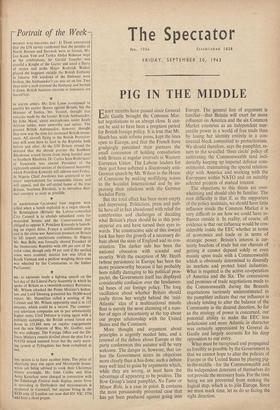PIG IN THE MIDDLE
EIGHT months have passed since General de Gaulle brought the Common Mar- ket negotiations to an abrupt close. It can- not be said to have been a pregnant period for British, foreign policy. It is true that Mr. Heath has, with infinite pains, kept the lines open to Europe, and that the French have grudgingly permitted their partners the small concession of holding consultation with Britain at regular intervals in Western European Union. The Labour leaders for their part have softened a disastrously anti- German speech by Mr. Wilson in the House of Commons by making mollifying noises to the Socialist International and by im- proving their relations with the German Socialist Party.
But the total effect has been more empty and depressing. Politicians, press and pub- lic have all in fact abandoned with relief the complexities and challenges of deciding what Britain's place should be in this post- imperial era and have turned their eyes in- wards. The constructive side of this inward look has been the growth of a necessary de- bate about the state of England and its con- stitution. The darker side has been the national obsession with scandal and security. With the exception of Mr. Heath (whose persistence in Europe has been the more praiseworthy because it has probably been mildly damaging to his political pros- pects), the Government itself has displayed considerable confusion over the fundamen- tal bases of our foreign policy. The long vacillation about whether Britain should really throw her weight behind the 'mid- Atlantic' idea of a multinational missile fleet is merely the most alarming of a num- ber of signs of uncertainty at the top about our proper relationship with the United States and the Continent.
More thought and argument about principles is urgently needed here, and a renewal of the debate about Europe at the party conferences this autumn will be very welcome. The danger is, however, that un- less the Government states its objectives more clearly than it has done, such a debate may well lead to gains byarguments which, while they are wrong, at least have the advantage of appearing to be positive. The Bow Group's latest pamphlet, No Tame or Minor Role, is a case in point. It contains the most persuasively presented case that has yet been produced against going into Europe. The general line of argument is familiar—that Britain will exert far more influence on America and the six Common Market countries as an independent mer- cantile power in a world of free trade than by losing her identity entirely in a con- tinental block committed to protectionism. We should therefore, says the pamphlet, re- turn to the so-called 'three circle' policy of cultivating the Commonwealth (and inci- dentally keeping up imperial defence com- mitments), maintaining the special relation- ship with America and working with the Europeans within NATO and on suitably selected projects of mutual interest.
The objections to this thesis are over- whelming and should als6 be familiar. The root difficulty is that if, as the supporters of the policy maintain, we should have little influence inside the Common Market it is very difficult to see how we could have in- fluence outside it. In reality, of course, all evidence is that our influence would be con- siderable inside the EEC whether in terms of economics and trade or in terms of strategic power. Britain's interest is cer- tainly freedom of trade but our chances of getting it cannot depend solely or even mainly upon trade with a Commonwealth which is obviously determined to diversify its markets and protect local industries. What is required is the active co-operation of America and the Six. The concessions and promises of trade negotiations made to the Commonwealth during the Brussels negotiations (seriously underestimated in the pamphlet) indicate that our influence is already tending to alter the balance of the Community in the desired direction. So far as the strategy of power is concerned, our potential ability to make the EEC less isolationist and more Atlantic in character was certainly appreciated by General de Gaulle and largely accounts for his deep opposition to our entry. What must be recognised and propagated as forcibly as possible by the Government is that we cannot hope to alter the policies of Europe or the United States by playing pig- in-the-middle—for the Commonwealth and the independent deterrent of themselves do not provide the necessary basis. For the time being we are prevented from making the logical step, -which is to join Europe. Since we must mark time, let us do so facing the right direction.






































 Previous page
Previous page